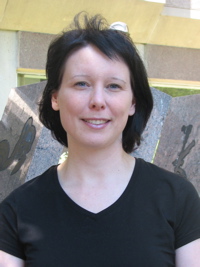The ABCs of CSI
New MS in Biomedical Forensic Sciences is the real deal

You may have seen CSI: Las Vegas or CSI: New York on TV, but this fall the real Crime Scene Investigation arrives at BU. The School of Medicine will debut a master’s program in biomedical forensic sciences that will provide real-world training for the work glamorized in shows like CSI.
“Real cases, obviously, are not solved as quickly and easily as on CSI,” says Tara Moore, associate director of the Biomedical Forensic Sciences Program at BUSM. “And one of the main ways the CSI shows are misleading is that it’s not one person doing all the work. The reality is that a multidisciplinary team of forensic experts is involved.”
The new program is designed to train a team member in a wider skill set. “It’s unusual to blend the study of biomedical sciences with forensic science,” says Moore, “but our new program is receiving a great deal of support from the forensic community. Many forensic scientists deal with cases that involve bodies or biological samples, and having a better understanding of biomedical sciences is very important.”
The two-year program will provide a unique opportunity to pursue a career in what is one of the fastest-growing scientific fields today. Graduates of the program will be prepared to take on jobs in forensic laboratories, law enforcement, medical examiner offices, law firms, the military, hospitals, pharmaceutical laboratories, and academics.
“As biomedical specialties continue to provide vital techniques and practices to forensic investigation, the need for broadly trained forensic professionals has become urgent nationally,” says Moore. “People trained in the basics of forensic science and a strong biomedical background will provide a crucial level of expertise to forensic investigations.”
The degree program is the only one of its kind in Massachusetts and one of only two such graduate programs in New England. “In our program, students will gain hands-on experience in laboratories using the same equipment found in forensic laboratories. Another unique aspect of our program is that many of our faculty are actively working in the field,” says Moore.
The BU program is also one of few in the country based at a major medical center. This will allow for unprecedented access to medical resources, including a DNA lab, biology and chemistry lab space with high-tech equipment, state-of-the-art lecture halls and seminar rooms, and a library of forensic journals and texts. “We actually have a number of major pieces of crime lab equipment similar to those in forensic laboratories which will provide our students with real hands-on experience with biological samples,” says Moore.
Elective courses will emphasize in-depth knowledge of various biomedical sciences such as pathology, death investigation, anthropology, and anatomy. In addition, several continuing educational opportunities for law enforcement officials and forensic scientists will be offered each year.
Moore attributes some of the recent growth in the forensics field to shows like CSI, but points to the problems that come with such glamorous inspiration. “CSI has definitely created a huge awareness of the field, which is good. Every child you can get interested in science is great. But forensics programs right now are seeing high attrition rates, with people dropping out after the first few months. Students start the program and realize it’s biology and chemistry and physics — and they drop out.”
Moore doesn’t anticipate such problems with BUSM’s inaugural class of about 25 students. “With our student quality I don’t think we’ll have that problem. We’ve enrolled students who did undergrad work in biology, chemistry, and forensics; people who are working in crime labs already; and a couple of law enforcement officials. This class knows what it’s getting into.”